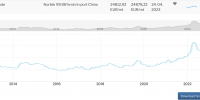Experts call for better recovery of precious metals from old equipment
09.07.2012 Accra / Bonn / Milan - The gold and silver treasure in electronic old devices is growing and growing: Every year, 310 tons of gold and 7.500 tons of silver worth 21 billion dollars are installed in high-tech devices such as laptops, smartphones or tablets. However, the vast majority of these precious metals - 85 percent - evaporates after the end of the gadget and only 15 percent are recovered, experts at the E-Waste Academy http://ewasteacademy.org of the United Nations University (UNU) and Global e-Sustainability report Initiative in Ghana.
Raw material instead of waste
So far, the topic of electronic waste has mostly been discussed under the aspect of harmful effects on developing countries. Wrongly, emphasizes Rüdiger Kuehr, head of the Solving the E-Waste Problem (StEP) initiative http://step-initiative.org. "Most people overlook the fact that e-waste contains many valuable elements that are recyclable. In addition, the reuse of the plastic parts is forgotten. "A ton of plastic recovered by recycling only requires a tenth of the water and energy of new plastic and saves a lot of CO2.
Above all, however, the focus is on the rare earth. The more the sale of electrical and electronic equipment is booming, the more gold, silver and other precious metals are available that can be recovered through recycling. At gold alone, gadgets consume 7,7 percent of the world's annual production, much more than the 5,3 percent of 2001. At the same time, the price of 300's ounces rose to 1.500 dollars, while global output rose only 15 percentages from 3.900 to 4.500 tons.
Affordability as a hurdle
Recovering from technology is highly complex, explains UNU expert Federico Magalini. "Precious metals in tiny doping are needed to increase the functionality of the devices. The fact that memory cards are becoming smaller, cheaper and more efficient is due to the platinum metal ruthenium. "The more complex the processing, the more difficult it is for recycling. Both experts regard the construction of large recycling plants in each country as "not effective". On the contrary, similar specializations are useful as in production.
"Not technically, but only from the point of view of affordability is the 100 percent recovery a problem," says Kühr. Political planning, promotion of sustainable consumption, recyclable device design and customer incentives for old devices are needed instead of merely hoping for investor interest, because: "The recycling rate has not risen as fast as the gold price. If it's all about profit, only the lightest measures will be implemented. One day, one will retrospectively ask how we were able to waste our natural resources so shortsighted today. "
Source: pressetext.com

